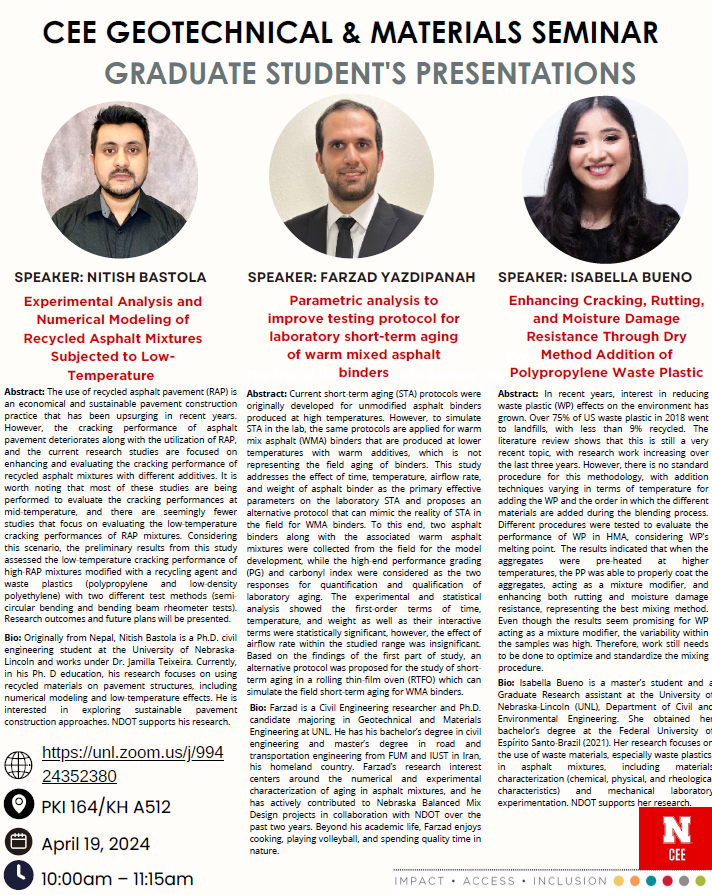
Who: Nitish Bastola, Farzad Yazdipanah, Isabella Bueno
When: Friday April 19 10AM
Where: PKI 164, KH A512, https://unl.zoom.us/j/99424352380
SPEAKER: NITISH BASTOLA
Experimental Analysis and Numerical Modeling of Recycled Asphalt Mixtures Subjected to Low-Temperature
Abstract: The use of recycled asphalt pavement (RAP) is an economical and sustainable pavement construction practice that has been upsurging in recent years. However, the cracking performance of asphalt pavement deteriorates along with the utilization of RAP, and the current research studies are focused on enhancing and evaluating the cracking performance of recycled asphalt mixtures with different additives. It is worth noting that most of these studies are being performed to evaluate the cracking performances at mid-temperature, and there are seemingly fewer studies that focus on evaluating the low-temperature cracking performances of RAP mixtures. Considering this scenario, the preliminary results from this study assessed the low-temperature cracking performance of high-RAP mixtures modified with a recycling agent and waste plastics (polypropylene and low-density polyethylene) with two different test methods (semi- circular bending and bending beam rheometer tests). Research outcomes and future plans will be presented.
Bio: Originally from Nepal, Nitish Bastola is a Ph.D. civil engineering student at the University of Nebraska- Lincoln and works under Dr. Jamilla Teixeira. Currently, in his Ph. D education, his research focuses on using recycled materials on pavement structures, including numerical modeling and low-temperature effects. He is interested in exploring sustainable pavement construction approaches. NDOT supports his research.
SPEAKER: FARZAD YAZDIPANAH
Abstract: Current short-term aging (STA) protocols were originally developed for unmodified asphalt binders produced at high temperatures. However, to simulate STA in the lab, the same protocols are applied for warm mix asphalt (WMA) binders that are produced at lower temperatures with warm additives, which is not representing the field aging of binders. This study addresses the effect of time, temperature, airflow rate, and weight of asphalt binder as the primary effective parameters on the laboratory STA and proposes an alternative protocol that can mimic the reality of STA in the field for WMA binders. To this end, two asphalt binders along with the associated warm asphalt mixtures were collected from the field for the model development, while the high-end performance grading (PG) and carbonyl index were considered as the two responses for quantification and qualification of laboratory aging. The experimental and statistical analysis showed the first-order terms of time, temperature, and weight as well as their interactive terms were statistically significant, however, the effect of airflow rate within the studied range was insignificant. Based on the findings of the first part of study, an alternative protocol was proposed for the study of short- term aging in a rolling thin-film oven (RTFO) which can simulate the field short-term aging for WMA binders.
Bio: Farzad is a Civil Engineering researcher and Ph.D. candidate majoring in Geotechnical and Materials Engineering at UNL. He has his bachelor’s degree in civil engineering and master’s degree in road and transportation engineering from FUM and IUST in Iran, his homeland country. Farzad’s research interest centers around the numerical and experimental characterization of aging in asphalt mixtures, and he has actively contributed to Nebraska Balanced Mix Design projects in collaboration with NDOT over the past two years. Beyond his academic life, Farzad enjoys cooking, playing volleyball, and spending quality time in nature.
SPEAKER: ISABELLA BUENO
Enhancing Cracking, Rutting, and Moisture Damage Resistance Through Dry Method Addition of Polypropylene Waste Plastic
Abstract: In recent years, interest in reducing waste plastic (WP) effects on the environment has grown. Over 75% of US waste plastic in 2018 went to landfills, with less than 9% recycled. The literature review shows that this is still a very recent topic, with research work increasing over the last three years. However, there is no standard procedure for this methodology, with addition techniques varying in terms of temperature for adding the WP and the order in which the different materials are added during the blending process. Different procedures were tested to evaluate the performance of WP in HMA, considering WP’s melting point. The results indicated that when the aggregates were pre-heated at higher temperatures, the PP was able to properly coat the aggregates, acting as a mixture modifier, and enhancing both rutting and moisture damage resistance, representing the best mixing method. Even though the results seem promising for WP acting as a mixture modifier, the variability within the samples was high. Therefore, work still needs to be done to optimize and standardize the mixing procedure.
Bio: Isabella Bueno is a master’s student and a Graduate Research assistant at the University of Nebraska-Lincoln (UNL), Department of Civil and Environmental Engineering. She obtained her bachelor’s degree at the Federal University of Espírito Santo-Brazil (2021). Her research focuses on the use of waste materials, especially waste plastics, in asphalt mixtures, including materials characterization (chemical, physical, and rheological characteristics) and mechanical laboratory experimentation. NDOT supports her research.